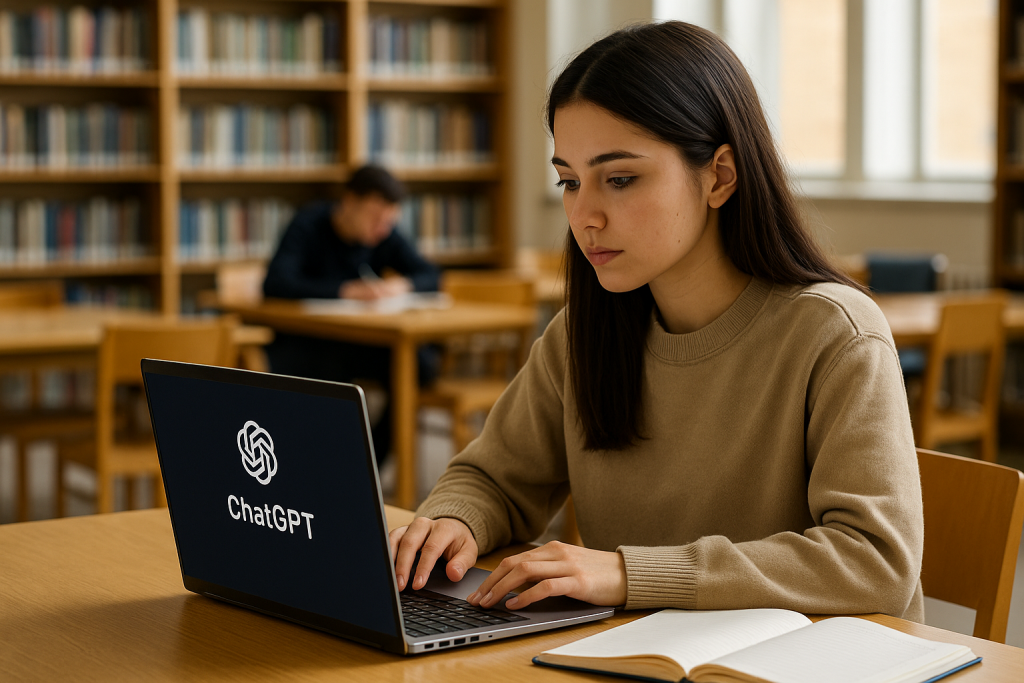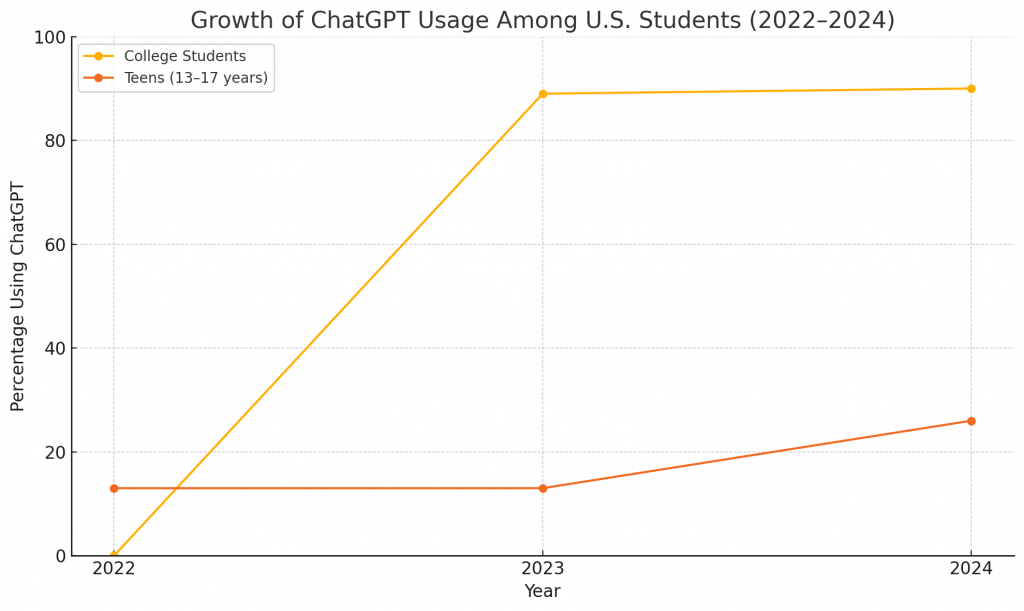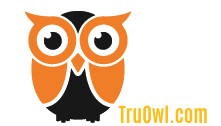
ChatGPT hit campuses across the U.S. as a revolutionary technology, changing how students learn, study and do assignments. While many love it, others are worried about academic integrity. So what’s the real story? Is ChatGPT a learning revolution or just a fancy way to cheat?
ChatGPT: A Quick Rise Among Students

Released in late 2022, ChatGPT quickly became popular among college and high school students. By early 2023, nearly 90% of college students admitted using ChatGPT for assignments. Among teens, usage doubled from 13% to 26% in just a year, reflecting a significant shift in study habits. Globally, a recent survey found 86% of students use AI tools in their studies, highlighting the widespread adoption of technologies like ChatGPT. Students now regularly use ChatGPT to:
- Summarize lengthy readings
- Create study guides
- Solve coding problems
- Brainstorm essay topics
As one student joked, “College now measures how well I can use ChatGPT.”
The Good: ChatGPT as a Study Buddy
When used responsibly, ChatGPT can be super helpful:
- Personal Tutor: ChatGPT breaks down complex concepts into simple explanations, almost like having a personal tutor available 24/7.
- Writing Assistant: It provides real-time suggestions to improve grammar, structure essays and overcome writer’s block.
- Creative Companion: Whether generating project ideas or quizzing on course material, ChatGPT helps students in creative and interactive ways.
- Skill Development: Encourages students to ask better questions and evaluate AI-generated answers critically.
Professor Jeanne Beatrix Law says, “ChatGPT can speed up research so students can focus on organizing big ideas instead of information gathering.”
The Bad: Cheating Made Easy
Unfortunately, ChatGPT isn’t all good news. Some students are misusing it and that’s causing big problems with academic integrity:
- AI-Generated Assignments: Some students submit entire essays or homework written by ChatGPT and pass it off as their own work.
- “AIgiarism”: Schools are now explicitly banning uncredited AI-generated work, it’s considered plagiarism.
- Shortcut Culture: Overusing ChatGPT can prevent actual learning and stunt skill development like critical thinking, writing and problem solving.
- Real Consequences: Students caught using ChatGPT dishonestly face academic penalties ranging from failing grades to suspension. A recent report found 63% of teachers saw students facing consequences for using generative AI improperly.
A Columbia University student said, “I used generative AI to cheat on almost every assignment” that’s how easy and tempting it is to misuse the technology.
How Schools are Responding
Initially schools banned ChatGPT outright but many are now focusing on guiding responsible use:
- Clear policies on acceptable ChatGPT use
- Workshops on ethical AI usage
- Adjusted teaching methods, personalized assignments harder to fake with AI
- Detection software to discourage cheating
For example, New York City Public Schools reversed their ChatGPT ban and are now educating students on responsible use; that’s an evolving stance. Some universities have gone back to traditional assessments like textbook exams to reduce AI-related cheating.
What Gen Z Thinks
Gen Z students are nuanced in their approach to ChatGPT. Most agree using it to generate complete assignments is crossing ethical lines. But they’re comfortable using it for research, brainstorming or study aids. Many students advocate for transparency, suggesting clearly acknowledging any AI assistance in assignments. A recent Pew survey found 54% of teens think it’s okay to use ChatGPT for researching new topics but only 18% for writing entire essays.
Future Perspectives: AI and Education
Looking ahead experts predict AI will become more integrated in education and clear ethical guidelines will be needed. Institutions will have to enhance curriculums that focus on skills AI can’t replicate easily—like creativity, critical thinking and interpersonal communication. Educator Tammy Wincup says, “Don’t block AI—establish safety protocols and teach responsible use, just like we’ve done with social media.” Recent studies in Nature found ChatGPT can both positively and negatively impact student learning depending on usage patterns. According to KPMG 67% of students using AI think they’re not learning as effectively as before.
The Way Forward
ChatGPT isn’t going away. It’s changing education for better and for worse. The key is responsible use:
- Use ChatGPT as a learning tool, not a crutch.
- Be transparent when utilizing AI assistance.
- Embrace ChatGPT to enhance skills, not replace them.
Ultimately, ChatGPT has incredible potential to support student learning. But, like any powerful tool, its value depends entirely on how students choose to wield it.
